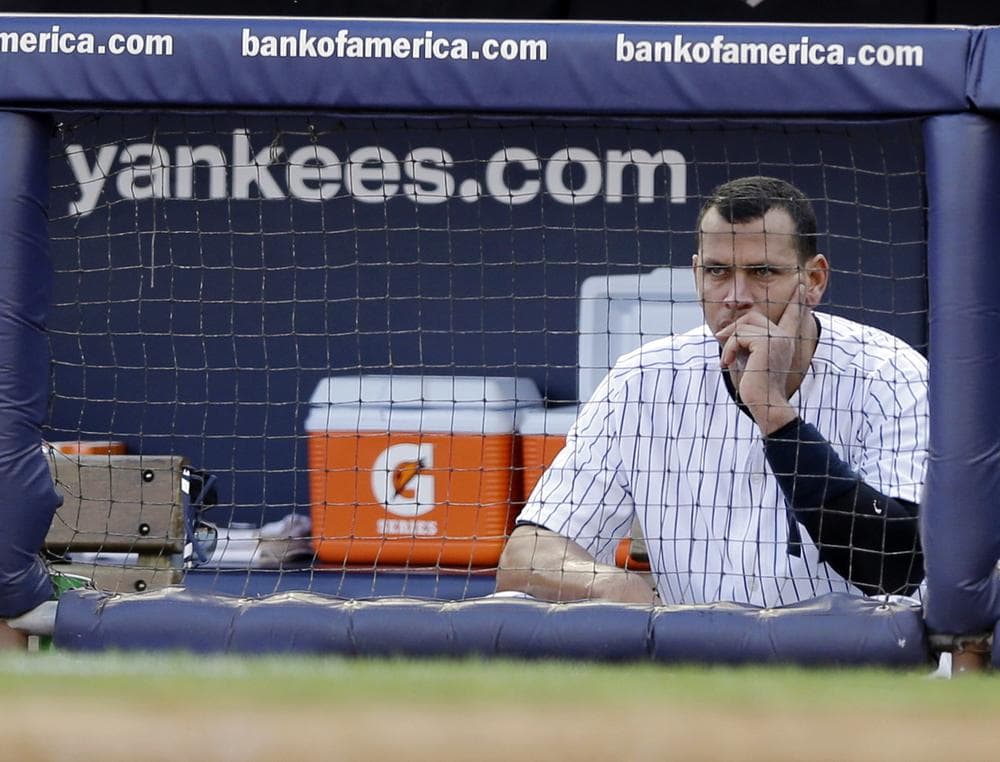Advertisement
In The News
Fallout From MLB's New PED Scandal Continues

When there are mounds of snow in colder U.S. climes, talk of baseball’s spring training provides hope. But it’s hard to dreams of spring training after a Miami newspaper report has revealed evidence that Alex Rodriguez, Melky Cabrera, and others players may have received performance enhancing drugs from a clinic in South Florida called Biogenesis. This week, another report linked Milwaukee Brewers slugger Ryan Braun to the clinic and Braun issued a statement saying his lawyers consulted with Biogenesis about his successful appeal of a suspension for steroid use.
CBSSports.com baseball columnist Danny Knobler joined Bill Littlefield to discuss the implications for the accused players and the sport.
BL: Last year, Ryan Braun avoided a 50-game suspension by contesting the chain of custody of a urine sample he provided for drug testing. In a column published this week, you wrote ”Ryan Braun, you're doing it to us again. Leaving us wondering. Leaving us asking questions. Leaving us in that zone of uncertainty that we'd hoped we had left behind.” What is the danger of that uncertainity for baseball?
DK: Baseball had for many, many years not been serious about the steroid problem. In recent years, they've gone completely the other direction to the point where they say - and they're probably right about this - that they have the strongest and strictest drug-testing system in professional sports. And one of the reasons for the big testing program is that we don't suspect everybody. We only suspect those who fail the tests. That's the real danger for baseball, that we go back in that era where any baseball player can be suspected.
BL: Back in 2009, Alex Rodriguez acknowledged that he'd used performance-enhancing drugs several years earlier, when he was playing for the Texas Rangers. He claimed he'd stopped. How do you see this playing out for Rodriguez?
DK: His reputation has already taken plenty of hits, not just for the performance-enhancing drugs, but also for his performance problems jsut on the field [laughs]. As somebody said, his performance hasn't been enhanced the last couple of years. I don't know if it's the last straw, but it's another straw.
BL: As you note in your column, the standard of proof for baseball’s drug-testing program is high, so it will take more than media reports to result in any suspensions. Do you believe baseball is especially motivated to pursue Braun and Alex Rodriguez?
DK: Oh, yeah. I don't think there's any question about that. In the case of Ryan Braun, MLB took the extraordinary step of releasing a statement publicly disagreeing with the arbitrator who overturned Braun's suspension. The proof on [Braun] is going to be more difficult. With Alex Rodriguez, there were clear listings of performance-enhancing drugs next to his name in the records of Biogenesis. In the case of Ryan Braun, his name appeared in the records, but not next to any drugs.
BL: Of the other players tied to the clinic, which ones do you think will get the most attention as the story plays out?
DK: If [MLB] can prove that a player made a purchase of [human growth hormone] or any of the other drugs that are against baseball rules - if they can prove it - they don't need a positive test to give a 50-game suspension. Now, they do need proof. The other two players who it would be very big news if they did suspended would be pitcher Gio Gonzales of the Washington Nationals, who was a 20-game winner last year, and outfield Nelson Cruz of the Texas Rangers.
BL: The prevailing sentiment prior to the Miami New Times report was that baseball had made progress in getting beyond the Steroids Era. Have all of those perceived gains been wiped out?
DK: Oh, I don't think all of them have been wiped out. This is certainly a step backward for baseball. However, because of the testing and [because] baseball was investigating this clinic and other sources before these stories came out, I don't think it's fair for anyone to - at this point - say baseball isn't serious about the problem. The question is more, how much progress they've made and how much still has to be made.
This segment aired on February 9, 2013.